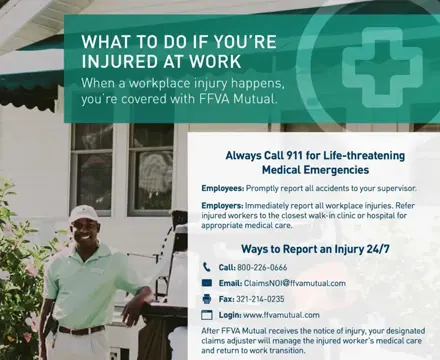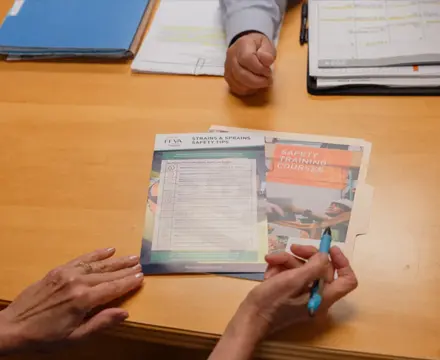Workers’ comp in Georgia is more than a legal requirement—it’s protection for both employers and employees. This state-mandated insurance program provides medical benefits and income support for injured workers while giving employers legal protection and risk management support. By understanding Georgia’s workers’ comp laws and choosing strong coverage, you not only stay compliant but also safeguard your team and keep business operations running smoothly.
This guide outlines the requirements under Georgia law, explains what workers’ compensation insurance covers and highlights employer responsibilities. Whether you’re new to the state’s workers’ comp system or looking to improve your processes, understanding these rules will help you stay compliant, reduce costs and support injured workers more effectively.
You can also explore our Employer FAQ or see how FFVA Mutual works with employers to manage claims, improve workplace safety and strengthen return-to-work outcomes.
Who Needs Workers’ Compensation Insurance in Georgia
Under Georgia law, most businesses with three or more employees are required to carry workers’ compensation insurance. This includes full-time, part-time and seasonal workers. Corporate officers and LLC members count toward this employee threshold, even if they choose to exempt themselves from coverage.
Some industries are treated differently under the law. For example, certain railroad employees, farm laborers and domestic workers may be exempt from the coverage requirement. However, for the majority of Georgia employers, workers’ comp coverage is mandatory.
Employers must also meet specific posting requirements. The Georgia State Board of Workers’ Compensation requires that businesses display notices informing employees of their rights and how to file a claim. These notices should include information about the company’s insurance coverage and the Panel of Physicians or Managed Care Organization (MCO) available for authorized medical care.
In addition, employers are responsible for explaining how the panel works to injured workers. This includes informing them of their right to select an authorized treating physician from the panel and, where needed, assisting them in contacting listed providers.
What the Georgia Workers’ Compensation Act Requires
The Georgia Workers’ Compensation Act, found in Georgia Code Title 34, Chapter 9, sets the legal framework for workers’ compensation in the state. The Georgia State Board of Workers’ Compensation enforces compliance, handles disputes and oversees the claims process. The Board also issues official rules that outline employer responsibilities, claim procedures and medical care requirements, which are enforced by law alongside the Act.
Failure to maintain required coverage can result in significant penalties, including fines and potential criminal charges.
What Does Workers’ Comp Cover in Georgia
Workers’ compensation in Georgia provides two primary categories of benefits for eligible injured employees: medical care and income replacement. Coverage typically includes:
- Medical treatment for work-related injuries or occupational illnesses from an authorized treating physician listed on the employer’s posted panel or MCO.
- Income benefits are payable starting on the 8th day of disability. If the injured worker is out of work for 21 consecutive days or more, payment for the initial 7-day waiting period is also required.
- Temporary Total Disability (TTD) benefits, generally up to 400 weeks, calculated at two-thirds of the employee’s average weekly wage, with a current maximum of $800 per week.
- Temporary Partial Disability (TPD) benefits, available for up to 350 weeks if the employee returns to a lower-paying job due to their injury, also calculated at two-thirds of the wage difference (up to a maximum of $ 533 per week).
- Permanent Partial Disability (PPD) benefits, determined by an impairment rating from an authorized treating physician.
- Death benefits for dependents, including two-thirds of the deceased employee’s average weekly wage (up to $800 per week) and burial expenses up to $7,500.
These benefits are designed to help injured workers recover and return to work while ensuring employers meet their legal obligations. Employers who understand these provisions are better positioned to manage claims efficiently, avoid disputes and maintain a healthy workplace.
What Are Georgia Employers Responsible For?
Under the Georgia Workers’ Compensation Act, every Georgia employer with three or more employees must carry valid workers’ compensation insurance. Beyond simply maintaining coverage, there are specific legal and procedural requirements that help ensure injured workers get timely medical care and benefits.
Employers must post a Panel of Physicians or an MCO notice in a prominent location. However, posting alone is not sufficient under Georgia law. When an injury is reported, the employer must take reasonable steps to ensure the injured worker understands how the panel functions, explain their right to select an authorized treating physician and provide appropriate assistance in contacting panel or MCO providers if needed.
If a work-related injury occurs, Georgia law requires the employer to immediately submit Form WC-1: First Report of Injury to the insurer after learning about the incident. Timely submission not only helps prevent claim delays but has also been shown to significantly reduce the average severity and cost of claims.
Employers also need to cooperate with the insurance company during the investigation of a workers’ compensation claim. This includes providing accurate details, incident reports and any relevant safety documentation.
If feasible, employers should offer transitional, light-duty or modified work assignments to help injured employees return to work sooner. This not only benefits the injured employee’s recovery but can also reduce workers’ comp benefits costs and the overall impact of a claim.
Maintaining complete and compliant records throughout the process protects both the employer and the employee under Georgia workers’ compensation law.
What To Do When an Employee Is Injured
A workplace injury requires prompt action from both the injured employee and the Georgia employer.
- Step 1: Immediate reporting: The injured worker must report the work-related injury within 30 days to maintain eligibility for workers’ compensation benefits.
- Step 2: Claim review: The insurance company investigates and issues a decision.
- Step 3: Benefit start: If approved, income benefits begin after the 7-day waiting period, with retroactive pay if the employee misses more than 21 consecutive days. Medical care from authorized treating physicians begins immediately.
How the Claims Process Works in Georgia
Navigating a Georgia workers’ compensation claim involves key steps of the claims process designed to ensure injured workers receive the benefits they’re entitled to under Georgia law.
Here’s how it works:
- Injury report: An injured worker must report the workplace injury to their employer within 30 days. Failing to do so can make them ineligible for Georgia workers’ compensation benefits.
- Employer report: After notification, the Georgia employer files Form WC-1 with the insurance company.
- Carrier investigation: The insurance company investigates the workers’ compensation claim to determine eligibility. This may include interviews, reviewing medical records from the authorized treating physician and verifying accident details.
- Claim acceptance or denial: The insurer must notify the injured worker if the claim is accepted or denied.
- Benefit payments: If approved, wage replacement (income benefits) begins after a 7-day waiting period. If the injured employee misses more than 21 consecutive days of work, they receive retroactive pay from the first missed day. Authorized and/or emergency medical care is covered from day one.
- Dispute resolution: If there’s disagreement, disputes can be resolved through mediation or a hearing before an administrative law judge with the Georgia State Board of Workers’ Compensation.
This process ensures compliance with the Georgia Workers’ Compensation Act while providing injured workers with authorized medical care and income benefits to replace lost wages during recovery.
Return-to-Work and Modified Duty Programs
A structured return-to-work program can significantly shorten the duration of a Georgia workers’ comp claim. By offering light-duty or modified tasks that fit the injured employee’s medical restrictions, employers help facilitate recovery while reducing costs.
FFVA Mutual provides Georgia employers with tools, templates and training to build customized return-to-work programs that comply with Georgia workers’ compensation law and support long-term employee well-being.
How To Get Workers’ Comp Insurance in Georgia
Georgia employers can secure workers’ compensation coverage in three main ways:
- Purchasing a policy from a licensed insurance company, such as FFVA Mutual
- Applying to self-insure (available for large, financially secure companies)
- Joining a self-insured group fund
When shopping for workers’ compensation insurance, look for policies that combine strong claims service, proactive risk control and return-to-work resources. Rates are based on factors like your industry’s NCCI classification code, number of employees, payroll and claims history.
A good workers’ comp insurance partner will also help you meet Georgia State Board of Workers’ Compensation requirements, file the right forms and reduce future claims through safety training and hazard prevention.
Tips for Managing Claims and Reducing Costs
Managing workers’ compensation claims effectively can lower premiums and improve workplace safety:
- Build a strong safety culture backed by documented procedures
- Implement return-to-work programs with modified duty assignments
- Review claims regularly with your insurance company to identify trends
- Train employees in injury reporting and workplace safety standards
- Maintain open and compassionate communication with injured workers during recovery
By combining prevention with efficient claim handling, Georgia employers can reduce the frequency and severity of workers’ compensation claims while protecting both their team and their bottom line.
Frequently Asked Questions About Workers’ Comp in Georgia
What Is Workers’ Comp in Georgia and Who Enforces It?
Workers’ comp in Georgia is a state-required insurance system that covers workplace injuries and occupational illnesses. It is regulated by the Georgia State Board of Workers’ Compensation, which oversees claims, disputes and compliance.
Who Must Carry Workers’ Compensation Insurance Under Georgia Law?
Most Georgia employers with three or more employees (including full-time, part-time and seasonal staff) must carry workers’ compensation insurance. Corporate officers and LLC members count toward the employee threshold even if they opt out of coverage.
How Does an Injured Worker Choose an Authorized Treating Physician in Georgia?
Georgia law requires employers to post a Panel of Physicians or Managed Care Organization procedures in a prominent place. Injured employees must pick their doctor from this panel and may make one physician change to another provider on the panel without needing board approval.
What Workers’ Compensation Benefits Are Available After a Workplace Injury?
Eligible workers may receive medical care, income benefits (such as Temporary Total Disability benefits, Temporary Partial Disability benefits, Permanent Partial Disability benefits) and, in severe cases, death benefits and burial expenses.
How Is the Average Weekly Wage Calculated for Workers’ Comp in Georgia?
The average weekly wage is typically based on the injured employee’s average earnings over the 13 weeks before the injury. This figure determines weekly income benefits and wage replacement amounts under the Georgia Workers’ Compensation Act.
Protect Your Team with the Right Coverage
FFVA Mutual partners with Georgia employers to provide workers’ compensation coverage that meets state requirements and goes beyond compliance. Our solutions include tailored safety programs, expert claims support and proven return-to-work strategies.
Get started with our Georgia Employer Toolkit for forms, resources and practical tips to manage workplace injury risks effectively. Watch our OnDemand Legal insights for Georgia Agents.






























